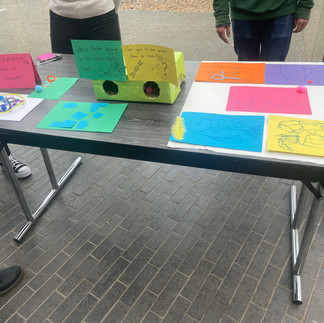Science communication, storytelling, and stand up comedy
- Michelle Taylor
- May 7, 2023
- 3 min read
Updated: Jun 23, 2023
Another great training opportunity presented itself last month….the Genetics Society’s Communicating Your Science workshop. We spent a great 3 days at the beautiful Chicheley Hall in Buckinghamshire learning all about the theory of science communication and putting it into practice.

The group of Ph.D. students and postdocs who attended the sci comm workshop and our wonderful trainers.
We started the course out with learning the narrative of storytelling and discussing why having a great story is so important when sharing our research. We made mini Ted talks that had to have a story switch. A story switch is when there is a flip in the state or emotion - i.e. despair to joy, rags to riches, ignorance to knowledge, and pain to comfort to name a few. I went with dead to alive. Not literally, but it is a great summary of my research on coral rubble beds. My Ted talk focused on a little fish called Cleo who was made homeless after her coral home was destroyed by a boat anchor. The coral reef was reduced to coral rubble and Cleo had to go searching for a new neighbourhood. After searching and finding nothing but occupied reef, Cleo returns to her previous home and discovers the rubble has spaces in it that she can use for protection and there are other organisms in there that she can eat. Moral of the story - although the human impacts are disastrous for our coral reefs the ruined remains that form coral rubble beds can still be beneficial to marine organisms.
Next on the schedule was stand up comedy! I never imagined that I would do stand up on a science communication course. But I did! And it actually wasn’t as scary as it sounded and I might even have enjoyed it! 🤣 It’s crazy that you can come up with a 3 minute routine in just 3 hours when you have never done stand up comedy before, and people find it funny! My routine focused on the endless paperwork that Ph.D. students need to do, but that even after considering what seems to be all possible risks you actually don’t include the one event that happens! I planned for boat capsizes, heat exhaustion, being stung by a lion fish, but I did not anticipate a lead diving weight and transect tape being dropped on my head!!!! 😂
Thursday afternoon was accessible science and hands on science. Ensuring everyone can access science is so important. Different backgrounds and priorities is essential for science to progress. If only the same people are involved how can advancements occur? Individually we had to come up with an activity for a science festival and then as groups of 5 we combined some of those activities to set up an entire science festival stand. Our table was a bit of a pick and mix with activities relating to mitochondria, white-tailed eagles and environmental DNA. I really enjoyed this activity and would definitely look at doing it again. I have always enjoyed working with children and this was a great way to see if I could relate my current work to a younger audience.
The hands on science activity I came up with - matching DNA to the organism to show how eDNA works.
Last day already and we were tasked with making a couple of TikTok videos. Video making is hard! You need to really think about the video you want to make. Plan. Plan. Plan! Then its filming time. We had to think about the background, how to hold our phones to avoid shaking, and consider lighting sources to make sure there aren't shadows on people's faces (unless you are aiming for that!). Editing takes so long! We used a really cooll app that lets you do all the editing on your phone, even adding music and text. All of the videos turned out really well. Most science content videos will take weeks of research, planning, filming and editing, while we had about 3.5 hours! I'm really proud of every one of the videos that was produced 😁
The "wonderful" video I managed to make in our TikTok video session.
We also got to enjoy the local "wildlife" that call Chicheley Hall home. The peacock is beautiful but it did make us wonder 🤔 about the natural habitat of the peacock and peahen. Obviously, they have been domesticated but where do they live other than in the grounds of 18th century manor houses!?


I had a great time at the workshop and would recommend it to anyone in science. Knowing how to share our results and science in general to a wide audience is essential! It’s a disservice to our work to not share it with others.









Comments